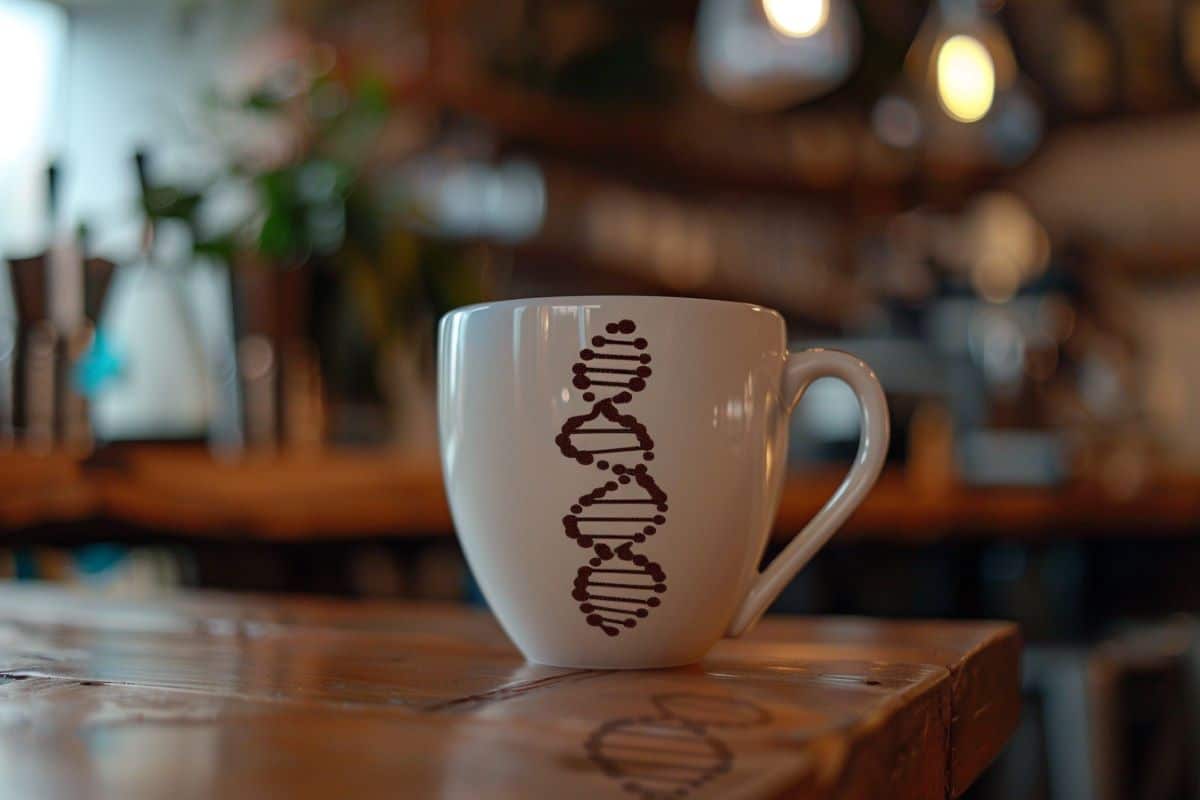Summary: A new study suggests that your love for coffee may be influenced by your genes. Researchers compared genetic data with coffee consumption habits in the U.S. and the U.K., finding a genetic link to coffee intake.
However, the study also revealed complex relationships between coffee consumption, certain health conditions, and the environment.
Key Facts:
- Genetic variants inherited from parents can influence how much coffee you drink.
- There are links between coffee consumption genetics and health outcomes like obesity and substance use.
- The relationship between coffee and psychiatric disorders varies between populations, suggesting environmental influence.
Source: University of Western Ontario
It’s 9 a.m. and coffee shops are bustling with the line for the drive-thru wrapped around the building. This is a common occurrence around the globe as coffee is one of the most widely consumed beverages.
But is our taste for coffee passed down from our parents? Or is it because of our environment?
Researchers from the Schulich School of Medicine & Dentistry and the University of California San Diego (UCSD) used genetic data as well as self-reported coffee-consumption numbers to assemble a genome-wide association study (GWAS). These types of studies use large volumes of genetic data to help researchers identify genetic variants, genes and biology associated with a particular disease or certain health traits.
The researchers compared coffee-consumption genetic characteristics from a 23andMe database in the U.S. with an even larger set of records in the United Kingdom.
“We used this data to identify regions on the genome associated with whether somebody is more or less likely to consume coffee, and then identify the genes and biology that could underlie coffee intake,” said Hayley Thorpe, the lead researcher on the study and a postdoctoral researcher at Western’s Schulich Medicine & Dentistry.
The results showed a genetic influence on coffee consumption. In other words, the particular gene variants inherited from parents influence how much coffee you are likely to consume.
The study was published in Neuropsychopharmacology.
However, the conclusions surrounding the health outcome of a cup of java were not so definitive.
The group’s genome-wide association study of 130,153 U.S.-based 23andMe research participants was compared with a similar UK Biobank database of 334,649 U.K. residents.
The comparison revealed consistent positive genetic associations between coffee and harmful health outcomes such as obesity and substance use in both populations. This doesn’t mean that someone who drinks coffee is going to use other substances or develop obesity, rather that genetic predisposition for coffee intake is related in some way to these traits, Thorpe said.
The findings became more complicated when looking at psychiatric conditions.
“Look at the genetics of anxiety, for instance, or bipolar and depression: In the 23andMe data set, they tend to be positively genetically correlated with coffee intake genetics,” Thorpe said. “But then, in the UK Biobank, you see the opposite pattern, where they’re negatively genetically correlated. This is not what we expected.”
The researchers noted other dissimilarities between the populations.
“We found positive associations between the genetics of coffee intake measured in 23andMe with psychiatric disorders, but these associations tended to be negative when examined in the UK Biobank,” Thorpe said.
“These divergences could be for many reasons, like a trade-off between tea and coffee intake differing between people in the U.S. and the U.K.”
While the study adds to the existing literature and helps to better understand how coffee might impact an individual’s health, more work is needed to understand the relationship between coffee, other substance use and health issues across unique environments, Thorpe said.
This study was done in collaboration with Schulich Medicine & Dentistry professor Jibran Khokar and UCSD professors Sandra Sanchez-Roige and Abraham Palmer.
About this genetics and caffeine consumption research news
Author: Cynthia Fazio
Source: University of Western Ontario
Contact: Cynthia Fazio – University of Western Ontario
Image: The image is credited to Neuroscience News
Original Research: Closed access.
“Genome-wide association studies of coffee intake in UK/US participants of European ancestry uncover cohort-specific genetic associations” by Hayley H. A. Thorpe et al. Neuropsychopharmacology
Abstract
Genome-wide association studies of coffee intake in UK/US participants of European ancestry uncover cohort-specific genetic associations
Coffee is one of the most widely consumed beverages. We performed a genome-wide association study (GWAS) of coffee intake in US-based 23andMe participants (N = 130,153) and identified 7 significant loci, with many replicating in three multi-ancestral cohorts.
We examined genetic correlations and performed a phenome-wide association study across hundreds of biomarkers, health, and lifestyle traits, then compared our results to the largest available GWAS of coffee intake from the UK Biobank (UKB; N = 334,659). We observed consistent positive genetic correlations with substance use and obesity in both cohorts.
Other genetic correlations were discrepant, including positive genetic correlations between coffee intake and psychiatric illnesses, pain, and gastrointestinal traits in 23andMe that were absent or negative in the UKB, and genetic correlations with cognition that were negative in 23andMe but positive in the UKB.
Phenome-wide association study using polygenic scores of coffee intake derived from 23andMe or UKB summary statistics also revealed consistent associations with increased odds of obesity- and red blood cell-related traits, but all other associations were cohort-specific.
Our study shows that the genetics of coffee intake associate with substance use and obesity across cohorts, but also that GWAS performed in different populations could capture cultural differences in the relationship between behavior and genetics.

Sarah Carter is a health and wellness expert residing in the UK. With a background in healthcare, she offers evidence-based advice on fitness, nutrition, and mental well-being, promoting healthier living for readers.








